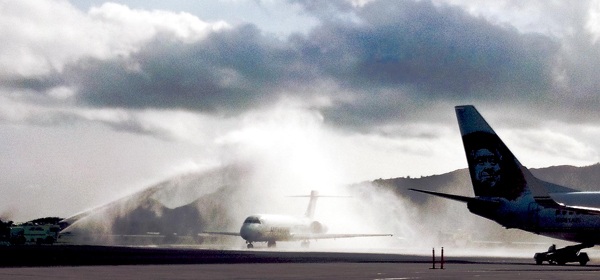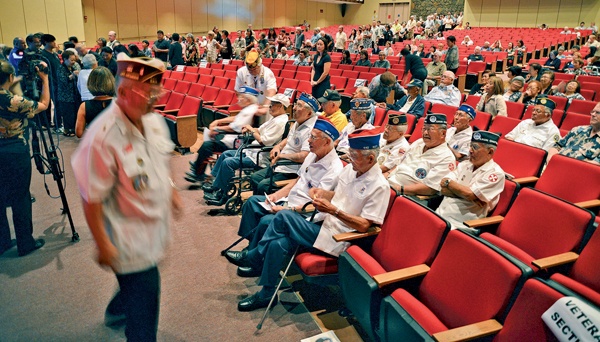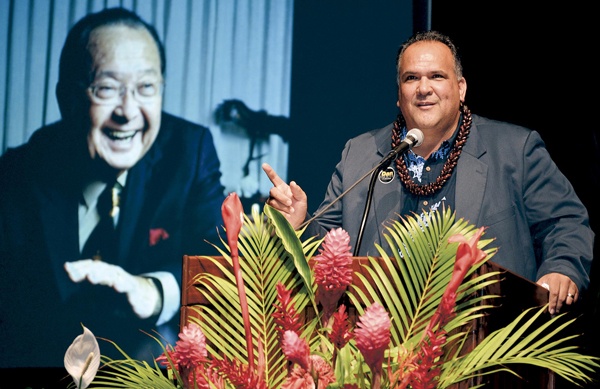Hundreds pay respect to late U.S. senator in Lihu‘e
LIHU‘E — Hundreds came to the Kaua‘i War Memorial Convention Hall in Lihu‘e Friday evening to pay respect and bid farewell to Sen. Daniel Inouye, who died Dec. 17 in Washington, D.C.
The event, attended by a string of influential members of the community, also served as an opportunity to give condolences to Inouye’s family, especially his wife, Irene Hirano Inouye, and his son, Daniel Ken Inouye.
“We are here to pay tribute to a man who made the extraordinary seem ordinary,” Mayor Bernard Carvalho Jr. said.
Rather than conveying sadness, the general feeling at the convention hall was a celebration of life. Speakers and audience members shared joy and laughter as stories were told about the decorated World War II veteran who built his post-war reputation throughout more than 50 years of public service, the majority of them as a U.S. senator.
Mattie Yoshioka emceed the event. Like Inouye, Yoshioka’s father-in-law fought in World War II in the highly decorated 442nd Regimental Combat Unit, made up entirely of Japanese Americans. And like Inouye, Yoshioka’s father-in-law also lost an arm in combat.
Several years ago, when she told Inouye of this similarity, she said the senator’s reply was, “Then you know why I love my country so much.”
And it was exactly Inouye’s love for the country, along with his courage, determination, caring, accomplishments, humility, humbleness and most of all, his aloha spirit, that punctuated the eulogies at his memorial services.
Calling Inouye “one of the greatest Americans who ever lived” and a “giant of a man in so many ways,” Carvalho, a tall man — and “husky,” according to Inouye’s teasing remarks — said the late senator may have been small in physical stature, but was one of the few people in the world who actually made him feel small while standing next to him.
“Sen. Inouye embodied aloha every day of his life,” Carvalho said in one of his most emotionally charged speeches to date.
“Perhaps one of his greatest accomplishments was to help define to the world what aloha really means,” he said.
State Rep. Derek Kawakami’s family had been a long-time friend of Inouye. Kawakami said when his family heard the news that “heaven had gained another angel,” everyone just sat in disbelief, without being able to grasp what happened.
“In our eyes and hearts, he was always unbreakable, made of the same materials that legends are made of — and legends never die,” he said.
Kawakami talked about Inouye’s generation, his peers at the 442nd Regiment who were the most decorated group in U.S. military history, and yet never boasted about it. He talked about a man who gave him personal and professional advice and had a way of making people feel important — Inouye would refer to Kawakami as cousin in front of many prominent politicians.
But Kawakami also brought the audience to laughter when he said that as a young child, he was terrified of Inouye, “the man with one arm,” because of the stories he had heard of him being shot in the stomach and having his arm blown up on the battlefield. Years later, when Kawakami became an adult, Inouye would tease him for that.
Samurai sword
Inouye’s cousin, Gladys Okada, went back in time to the 19th century. She backtracked to when Inouye’s grandparents emigrated from Japan to Hawai‘i in 1899. They arrived here with their 4-year-old son, Hyotaro, who fathered Inouye 25 years later.
Inouye’s grandparents left two daughters in Japan, and one of them gave birth to Okada, who as a young girl always heard highly of Inouye through her mother.
When Okada was 7 years old, her family traveled by steamship from Japan to Hawai‘i. The very first time she looked at Inouye, he gave her a smile, the same smile he carried his whole life, she said.
“That was in 1938,” Okada said. “Three years later, the war broke out and the rest is history.”
After the war, Inouye came back home a hero, she said. From then on, Inouye got an education and went on to public service. Okada went to college and became a teacher on Kaua‘i. The two cousins remained close their entire life.
Okada told a few funny stories, such as when Inouye visited her 4th grade class on Kaua‘i, and one of her students refused to wash his hands for days because a U.S. senator had given him a hand shake.
“Too bad Ron Kouchi wasn’t my student then,” Okada said of Kaua‘i’s state senator, bringing laughter to the audience. “He came later.”
She said Inouye, a man of humble beginnings, remembered his roots because his mother told him to never forget where he came from. When he, already a U.S. senator, once visited the Japanese countryside village where his family came from, he was received with a big celebration and was presented with a samurai sword.
Wrapping up her speech, Okada said she appreciates all the courageous deeds he had done for the people, and that his journey to Washington was something men only dream about.
“But you not only walked the halls of Congress, but you walked the dark alleys, the ghettos, the city corners, street corners and city blocks,” Okada said. “And you flew over majestic mountains, over planes, valleys, crossed oceans, rivers, to do your work, and you accomplished such a gigantic jest that only a giant could do this. God, we look at you as … a gentle giant, that … gave Hawai‘i its salvation and gave Hawai‘i its second birth.”
A man with a vision
Capt. Nicholas Mongillo, Commanding Officer of Pacific Missile Range Facility in the Westside, said PMRF was slated for possible closure in the 1990s, but thanks to Inouye, it expanded its operations. Today, PMRF employs approximately 1,000 people, and is the leading high-technology employer on the island.
“One man with determination and a vision made a difference,” said Mongillo, who developed a close relationship with Inouye over the last couple years. “And he made a vision in education too.”
Mongillo said he too was sad with Inouye’s death. “But we must rejoice,” said Mongillo, remembering Inouye as a father figure, a friend, a mentor and a teacher. “What better legacy to leave?”
He said Inouye overcame racial discrimination in World War II, fought with valor, won a medal of honor, educated himself, was elected to the highest office of the U.S.
“What a full and rewarding life! God bless Sen. Daniel Inouye and God bless America,” Mongillo said.
Ron Sakoda had been a long-time friend and representative of Inouye on Kaua‘i. He said the senator pushed people to try harder and do things better. Sakoda caused laughter in the audience when he said Inouye got him to buy nice clothes, wear shoes and even get a hair cut.
Besides putting emphasis on national security, Inouye fought hard for education and to bring down racial barriers, among other things.
“He made it OK to be Asian-American,” said Sakoda, adding that Inouye voted to confirm the first Filipino-American to the U.S. Federal Court, judge Alfred Laureta.
Dave Kane made the opening remarks, and also the benediction shortly before Yoshioka’s closing remarks.
Kane said Inouye once gave him a “gentle scolding” for not sporting a white handkerchief on his suit’s left pocket. Friday evening, a white handkerchief was peeking out of Kane’s pocket.
“Dan, here it is,” said Kane, tapping three times on his chest pocket, and pointing his index to the sky.
“I have a feeling he will still be watching out for Hawai‘i,” Kane said.
Memorial services
When the doors at the convention hall opened at 4 p.m., Federal Transportation Security Administration staff stood on the hallway, while Kaua‘i Police Department officers, including KPD Chief Darryl Perry and KPD Deputy Chief Michael Contrades, stood outside.
Some of those who attended the event included Kaua‘i County Council members Gary Hooser, Tim Bynum and Mel Rapozo, former council members Kaipo Asing, KipuKai Kuali‘i and Dickie Chang, former Mayor Maryanne Kusaka, state Senate Vice President Ron Kouchi, state Reps. Jimmy Tokioka and Dee Morikawa, Kaua‘i Visitors Bureau Executive Director Sue Kanoho, Kaua‘i Chamber of Commerce President Randy Francisco, County Prosecutor Justin Kollar, county Film Commissioner Art Umezu and Grove Farm Vice President Michael Tresler.
In the convention hall’s auditorium, a video of Inouye played on a large screen until 5 p.m., when Yoshioka formally welcomed everyone.
Shelly Koerte, Joni Keamoi and DJ Yaris performed “Star Spangled Banner,” the national anthem, and a few in the audience sang along. Keola Alalem Worthington joined them to sing “Hawai‘i Pono‘i,” considered the Hawaiian Kingdom anthem, and many more in the audience joined the quartet.
After Kane’s opening remarks, Chipper Wichman conducted a prayer, in Hawaiian and in English language. Shelly Koerte gave a solo a capella performance of “Amazing Grace.”
Okada and Kawakami addressed the audience, and ‘ukulele virtuoso Aldrine Guerrero performed “Over the Rainbow.”
Mongillo, Sakoda and Carvalho followed with their addresses. Carvalho then sang “Aloha ‘Oe,” and everyone in the audience stood up, with many singing along. After Kane’s benediction, Yoshioka gave the closing remarks.
Immediately following the event, two of Inouye’s favorite foods, chicken wings and SPAM musubi, were served along with refreshments. The only thing missing was a saimin bowl.
“His favorite meal was Hamura Saimin and SPAM musubi,” Sakoda said.
Sen. Daniel Inouye: A life of service
• Born Sept. 7, 1924
• William McKinley High School, graduated 1942
• U.S. Army 442nd Regimental Combat Team 1943-1947: Medal of Honor, Bronze Star Medal, Purple Heart, European-African-Middle Eastern Campaign Medal, World War II Victory Medal
• University of Hawai‘i at Manoa, graduated 1950
• George Washington University Law School, graduated 1952
• Hawai‘i Territorial House of Representatives, 1954-1958
• Hawai‘i Territorial Senate, 1958-1959
• U.S. House of Representatives, 1959-1963
• U.S. Senate, 1963-2012
• President Pro-Tempore of the U.S. Senate, 2010-2012
A few of Inouye’s many accomplishments
Pacific Missile Range Facility
• PMRF, located on the Westside of Kaua‘i, features the military’s latest technology in protecting both Hawai‘i and the U.S. from the threat of ballistic missile attacks.
Kilauea Point and Hanalei National Wildlife Refuge
• Over the years, significant federal funds have been appropriated to establish and then expand the Kilauea Point National Wildlife Refuge and Hanalei National Wildlife Refuge, including the restoration of the Hanalei Bridge, on the Island of Kaua‘i. Kilauea Point Lighthouse station restoration continues to be a priority.
County buses
• Maui, Kaua‘i and Hawai‘i counties regularly receive capital funding for the purchase of buses and installation of bus stops.
The Kikiaola Small Boat Harbor
• More than $22 million in federal funds were secured to ensure a higher level of navigational safety for the people of Kaua‘i.
• Source www.inouye.senate.gov.




